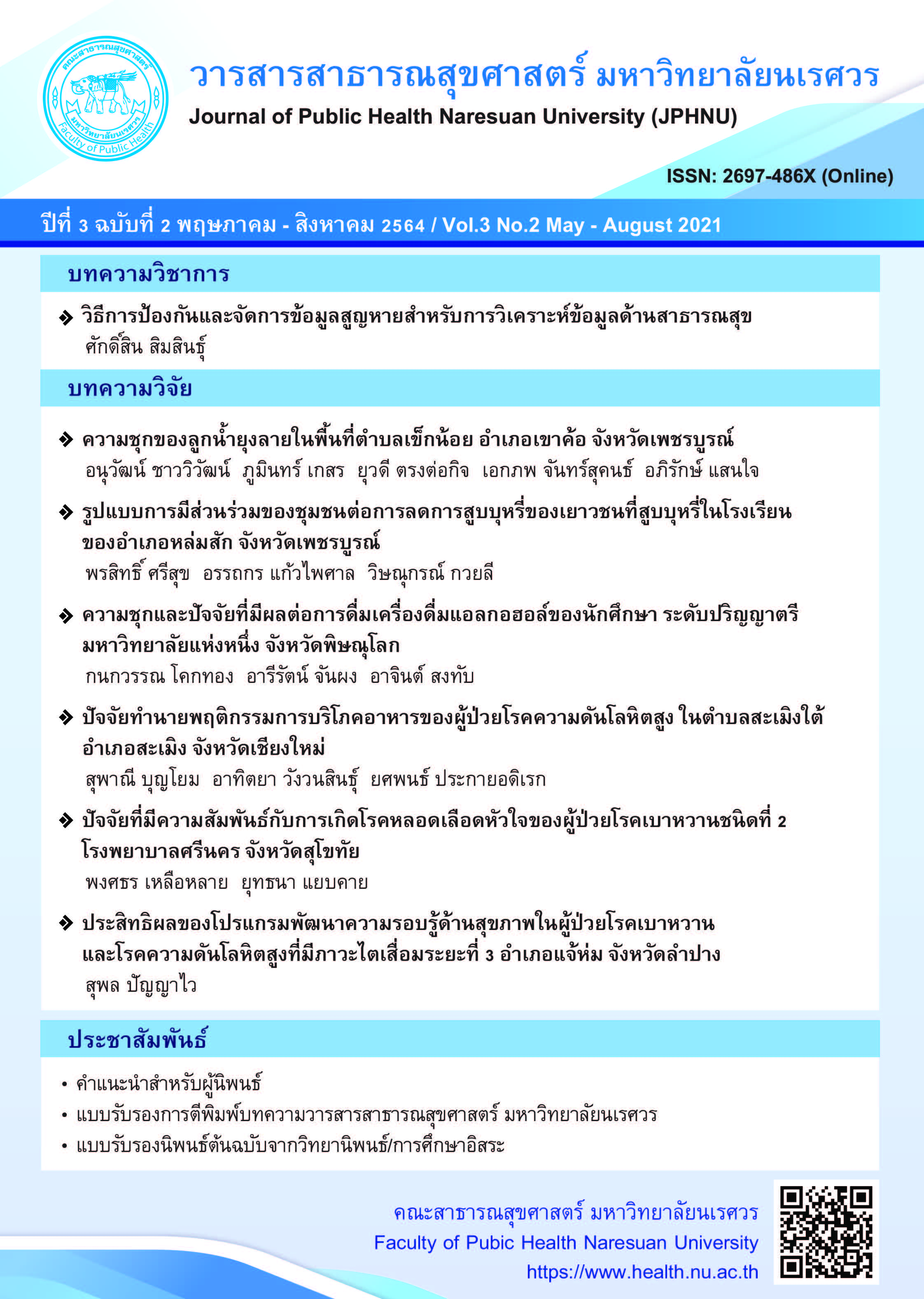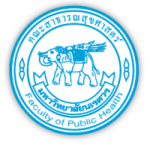Factors predicting food consumption behavior of hypertensive patients in Samoeng Tai Subdistrict, Samoeng District, Chiang Mai Province
Keywords:
Hypertension, Health Belief Model, NutritionAbstract
This present study aimed to evaluate the food consumption behavior and analyze factors predicting food consumption behavior among hypertensive patients in Samoeng Tai Subdistrict, Samoeng District, Chiang Mai Province. Two hundred and seventy-one patients with hypertension, selected using a systematic random sampling method, were enrolled in the study. Data were collected by questionnaire and analyzed using descriptive statistics and stepwise multiple regression analysis.
The results showed that most of the study subjects had high levels of knowledge about dietary-related hypertension, perception of risk for complications, perception of the severity of hypertension, perception of benefits of the consumption of dietary-related hypertension, and perception of obstacles of dietary-related hypertension. Food consumption behaviors were at a medium level. The statistically significant predictors of food consumption behavior were age (β = 0.572) knowledge about dietary-related hypertension (β = - 0.318) perception of the severity of hypertension (β = 0.225) and perception of obstacles of dietary-related hypertension (β = - 0.150). The model explained 52.3% of food consumption behaviors (p-value < 0.001). These findings should be considered as a guideline for the development of activities to change the dietary behavior of patients with hypertension in preventing patients' complications.
References
Becker, M. H. (1974).The Health Belief Model and preventive health behavior. Health Education Monographs, 2(4), 354-385.
Becker, M. H., Maiman, L. A., Kirscht, J. P., Haefner, D. P., & Drachman, R. H. (1977). The Health
Belief Model and prediction of dietary compliance: A field experiment. Journal of Health Social Behavior, 18(4), 348-366.
Best, J. W. (1977). Research in education. (3rd ed.). Engle Clift, NJ: Prentice-Hall.
Chaitokkia, S. (2018). Factors affecting food consumption behaviors of adults in Northeast
Thailand. Research and Development Journal, Loei Rajabhat University, 13(45), 68-78. (in Thai)
Chiangmai Provincial Public Health Office. (2018). SMART NCD. Retrieved October 16, 2018,
from https://smart-ncd.chiangmaihealth.go.th/web/index.php. (in Thai)
Chobanian, A. V., Barkris, G. L. & Black, H. R. (2003). The seventh report of the joint national
committee on prevention, detection, evaluation and treatment of high blood pressure: The JNC report. JAMA, 289(19), 2560-2572.
Fishbein, M., & Ajzen, I. (1975). Belief, attitude, intentions and behavior: An introduction to
theory and research. Boston, MA: Addison-Wesley.
Hanarong, A., Toonsiri, C., & Rattanagreethakul, S. (2017). Factors affecting eating behaviors
among hypertensive patients. The Journal of Faculty of Nursing Burapha University, 25(3), 52-65. (in Thai)
Johnson, D. W., Johnson, R. T., & Holubec, E. J. (1993). Circles of learning: Cooperation in the classroom. (4th ed.). Minnesota: Interaction Book Company.
Joint National Committee [JNC]. (2003). The seventh report of the joint national committee
on prevention, detection, evaluation and treatment of high blood pressure: The JNC
report. The Journal of the American Medical Association, 289(19), 2560-2571.
Kirshner, H. S. (2009). Differentiating ischemic stroke subtypes: Risk factors and secondary
prevention. Journal of the Neurological Sciences, 279(1),1-8.
Ministry of Public Health. (2018). Percentage of hypertensive patients with good pressure
in Health Region 1 in annual budget 2018. Retrieved November 2, 2018, from https://hdcservice.moph.go.th/hdc/main/index.php. (in Thai)
Ministry of Public Health. (2019). Health Data Center. Retrieved February 20, 2019, from
https://hdcservice.moph.go.th/hdc/main/index.php. (in Thai)
Onsrinoi, N., Leelukkanaveera, Y., & Toonsiri, C. (2017). Predictive factors of hypertension
preventive behaviors among people with pre-hypertension. Songklanagarind Journal of Nursing, 37(1), 63-74. (in Thai)
Pender, N. J. (1987). Health promotion in nursing practice. New York: Appleton & Lang.
Plianbumroong, D. (2016). Health perceptions and health behaviors of pre-hypertension client.
Journal of Nursing and Health Care, 34(1), 83-92. (in Thai)
Praiwong, C., Satyawongthip, W., & Sikut, P. (2017). The study of health beliefs and self-care
behaviors of patients with hypertension in Sung Noen District, Nakhon Ratchasima
Province. Journal of Nakhonratchasima College, 11(1), 107-116. (in Thai)
Purateerarrath, P., & Wongpiriyayothar, A. (2019). The relationships between health beliefs
and health behaviors among essential hypertension patients of hypertension clinic, Surin Hospital. Medical Journal of Srisaket SurinBuriram Hospital, 34(2), 257-272. (in Thai)
Wayne, W. D. (1995). Biostatistics: A foundation of analysis in the health sciences. New
Jersey: John Wiley & Sons, Inc. World Health Organization. (2014). Global status report on noncommunicable diseases 2014. Geneva: WHO Press.
Downloads
Published
How to Cite
Issue
Section
License
The published article is copyrighted by the Journal of Public Health and Health Sciences Research.
The statements that appear in each article in this academic and research journal are the personal opinions of each author and are not related to Naresuan University and other faculty members in the university. Responsibilities regarding each article are the responsibility of each author.






